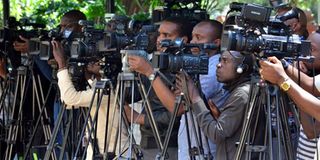‘Fourth Estate’ must adjust to the changing times and tide or perish

What you need to know:
- Right across the channels — print, radio, television, the internet and social media — the media essentially exists to communicate.
- Without the media, such critical information as how to steer clear of the ravages of Covid-19 would be difficult to disseminate.
- We should now address issues such as media sustainability, innovation, funding, legislation and diversification of voices.
The media industry is on the cusp of an irreversible revolution. But nothing could have clarified this eventuality than the socioeconomic disruption visited upon humanity by Covid-19.
What will not change soon, nonetheless, is the role of the ‘Fourth Estate’ in society.
Right across the channels — print, radio, television, the internet and social media — the media essentially exists to communicate.
The ability to relay information, persuade and influence behaviour is crucial in all human endeavours. This is best illustrated in the Biblical account of the Tower of Babel.
During its infancy, despite a common goal backed by highly motivated actors, the project collapsed courtesy of a communication breakdown.
The media also has a watchdog oversight role. You can imagine the chaos that would ensue if powerful people had an open chance to ride roughshod over the weak in society without the media!
The need for entertainment — which the media delivers to diverse audiences — is hard-wired to the human psyche.
CRITICAL INFORMATION
Without the media, more so community-based radio and TV, such critical information as how to steer clear of the ravages of Covid-19 would be difficult to disseminate. As an agent of sensitisation and awareness creation, it has no equivalent.
The level of influence — unfortunately, both good and bad — the media is capable of imparting on society is incredible.
Indeed, the media is a much bigger mediator of modern-day socialisation than many other influencers of human conduct and beliefs. The media is a companion no government can ignore.
We should now address issues such as media sustainability, innovation, funding, legislation and diversification of voices.
MEDIA SUSTAINABILITY
A lot has been said about media sustainability but the onset of Covid-19 and subsequent desolation has added a new angle to the subject.
Lest we forget, times were hard for the media in Kenya prior to the novel coronavirus outbreak.
In the past decade, especially, traditional media has lost significant clout throughout the world.
The dominance of social media in that period, coupled with the proliferation of handheld transmitting devices, has led to unprecedented media consumption trends.
Notably, of late, community-based media targeting audiences defined by certain idiosyncrasies that demand specificity of form and substance have been on a steady upsurge.
The transformations in the media landscape beg new models that hold the key to sustainability. No knee-jerk intervention will deliver the desired solution.
WAKE-UP CALL
The recent lay-offs in the mainstream media, especially, should serve more as a wake-up call than a reason for blanket condemnation.
In the prevailing circumstances, a wholesome rethink of how to enable media to survive the dissonance caused by the changing times and tide is criticnot never be real freedom of the media until the industry is sustainable.
They say comfort zones are bliss.
Traditionally, media houses enjoyed more predictable ways of planning for growth. With expanding digital media uptake, many companies, including blue chips, have joined the online bandwagon.
Only thoughtful innovation can mitigate the downward spiral of traditional media’s fortunes. Perhaps, this is the time for a funding model that draws synergy from public, private and community media.
MEDIA DIVERSITY FUND
A media diversity fund — which Canada, South Africa and Sweden have tried — is an option too.
But most critical and urgent is the need for a thorough review of laws relating to the media and its practice. Does the regulatory environment hinder innovation? Do we need to legislate certain provisions that may have been overtaken by technology?
We need to carefully steer the media to safe shores, particularly viewed against the backdrop of an imminent political contestation down the road and the upcoming Building Bridges Initiative debate.
Mr Omwoyo is CEO, Media Council of Kenya (MCK). [email protected] @davidomwoyo





